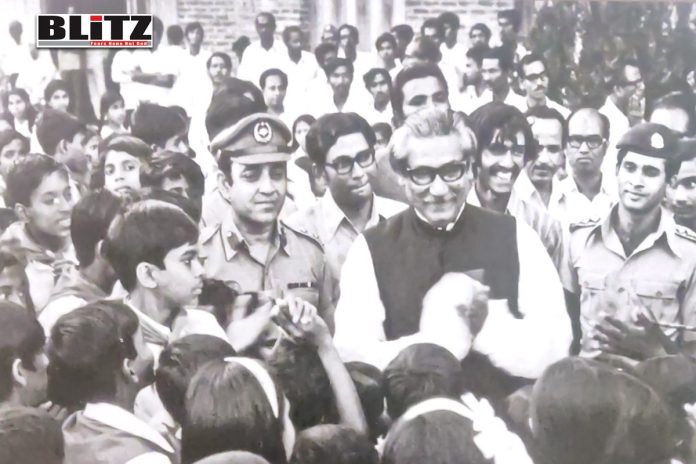In the annals of history, the legacy of Bangabandhu Sheikh Mujibur Rahman, the revered Father of the Nation of Bangladesh, stands as a testament to the indomitable spirit of resilience, sacrifice, and unwavering commitment to the people. His life’s journey, from humble beginnings to becoming the architect of Bangladesh’s independence, serves as a timeless source of inspiration for generations to come. Today’s youth, grappling with the complexities of a rapidly evolving world, can glean invaluable lessons from the principles and ideals espoused by this visionary leader.
Bangabandhu’s ascent to leadership was profoundly influenced by his interactions with revered figures like Huseyn Shaheed Suhrawardy, Sher-e-Bangla A K Fazlul Haque, and Moulana Abdul Hamid Khan Bhashani. Their sage counsel and mentorship imbued him with a steadfast resolve and sharpened his political acumen. Even in his early years, he exhibited a natural empathy towards the struggles of his compatriots, laying a solid foundation for a lifelong commitment to serving his nation selflessly.
Throughout his illustrious political career, Bangabandhu led numerous movements against oppression and injustice, each imbued with the fervor of his unwavering commitment to the cause of his people. The Language Movement of 1952, the Six-Point Movement in 1966, and his impassioned address on the 7th of March, 1971, stand as pivotal moments in Bangladesh’s struggle for independence, galvanizing the masses and igniting the flames of resistance against tyranny.
Bangabandhu’s legacy extends far beyond his political acumen, finding its deepest roots in his boundless love for his people. His poignant declaration, “My greatest strength is the love for my people, my greatest weakness is that I love them too much,” encapsulates the essence of his leadership philosophy. It reflects a profound sense of compassion, empathy, and an unyielding dedication to the well-being of his fellow citizens. Moreover, his emphasis on ethics, self-criticism, and self-control underscores the vital role of responsible citizenship and active engagement in the collective endeavor of nation-building. Through his words and actions, Bangabandhu exemplifies the transformative power of genuine empathy and unwavering commitment to the greater good.
Central to Bangabandhu’s vision was his unwavering belief in the principles of justice, equality, and dignity for all. His prescient instructions during his speech declaring Bangladesh’s independence on 26th March 1971, serve as a testament to his foresight and unwavering resolve, even in the face of imminent danger. His life exemplifies the transformative power of resilience, determination, and unwavering commitment to the cause of justice and freedom.
In the intricate tapestry of the contemporary world, Bangabandhu’s ideals emerge as a guiding beacon, shedding light on the journey towards a fairer, more inclusive, and compassionate society. His resolute commitment to his principles, unwavering even in the face of formidable challenges, ignites a flame of courage and conviction within the hearts of today’s youth. As they navigate the complexities of their era, Bangabandhu’s legacy transcends temporal boundaries, resonating deeply with successive generations. His timeless message urges them to embrace his enduring ideals and to fervently pursue the noble task of crafting a brighter future for all. In doing so, they honor his memory and perpetuate the essence of his vision for a world founded upon justice, equality, and unwavering compassion.
Bangabandhu Sheikh Mujibur Rahman’s legacy stands as an enduring testament to the profound impact of leadership, sacrifice, and an unwavering dedication to the pursuit of justice and freedom. His life journey embodies the true essence of patriotism, characterized by boundless love, selfless sacrifice, and an unwavering commitment to the upliftment of humanity. As we pay homage to his memory and celebrate his lasting influence, let us not only remember his teachings but also actively embrace them. By following in his footsteps, we can strive towards the creation of a more equitable, compassionate, and just world, ensuring that his legacy continues to inspire and guide generations to come.




